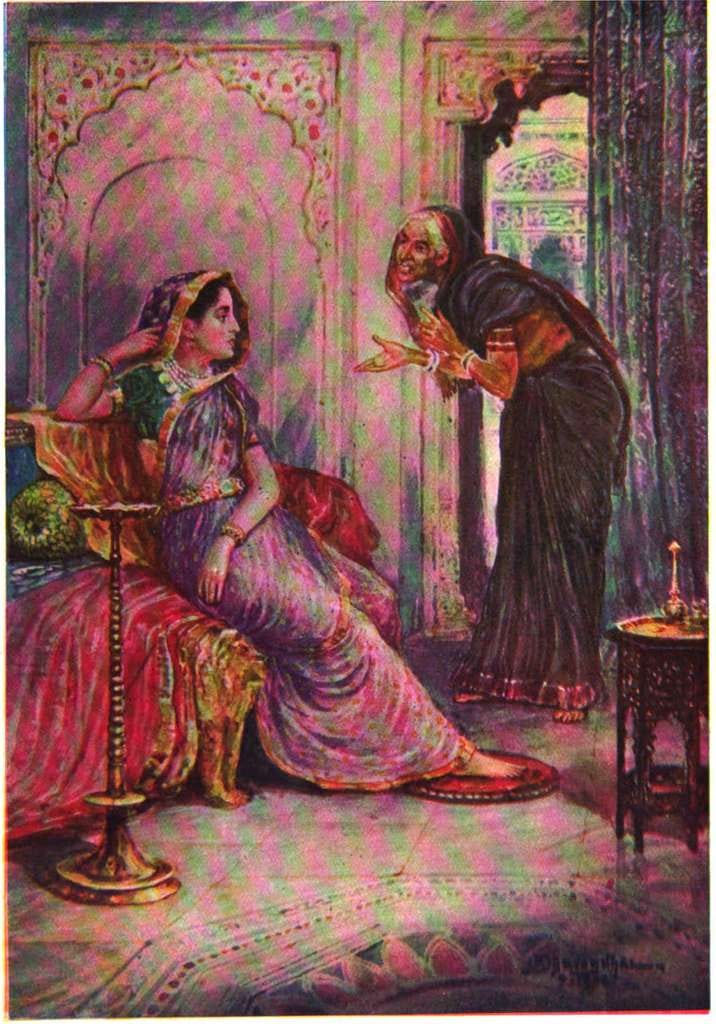
Once upon a time, in ancient lands, west of the Indus River, lay a kingdom ruled by a benevolent and much-loved king, King Dasha. He had three wives, Queen Kaus, Queen Sumi, and his youngest Queen Kai. Though he loved them equally, first among his equal wives was his youngest Queen.
One day, the King went out in battle, with his favorite Queen Kai by his side. In battle, the King fell unconscious and was spirited away by the Queen. Recovering, he returned to battle and vanquished the enemy. Pleased with the Queen for saving his life, the King granted her two wishes. However, the Queen requested that they be deferred for her to claim in the future. The King agreed.
Many years passed, but the King remained childless.
The Royal Priest, a wise sage, suggested that the King would benefit by performing a holy sacrifice in honor of the Lord of Fire.
In ancient times, these rituals were highly elaborate, and conducted across many days and weeks. The Gods, when pleased, appeared in person to grant favors.
The sacrifice1 went according to plan, and pleased, the Lord of Fire emerged from the raging sacrificial fire and presented the King with a pot of milk-based sweet called kheer to share with his Queens. The King distributed the kheer to each of his Queens, and then, gave his second Queen, the final leftovers.
In time, the Queens became pregnant and gave birth to four sons. The first Queen’s son was named Rama, while the second Queen had twins, Lakshmana. and Shatrugunha. and the youngest had Bharata. The entire kingdom rejoiced at the birth of the four princes.
The brothers grew up close, were educated together, and when of age, married four beautiful Princesses.
The King decided, as the oldest and the apple of his eye, to crown Rama, Prince and heir to his throne.
Preparations went into full swing for the grand day, lighting up the kingdom with anticipation. Festivities extended for weeks beforehand. Rama was the beloved of the people as well.
As the youngest queen rejoiced and prepared for the event, her maid—a hunchback who had accompanied her from her paternal home—entered the chamber, wearing a serious expression.
She questioned the Queen’s joy in celebrating the crowning of her peer Queen’s son, emphasizing the potential danger to the Queen herself. The maid suggested that she would be enslaved by the first Queen and that her capable son, Bharata., would forever languish as a servant to Rama.
Throughout the following days, the maid continued to poison the young Queen’s mind against Rama and Rama’s mother, gradually turning the friendly stepmother—who had once doted on Rama—into an archetype of the evil stepmother.
Though perturbed by these unsettling hypothetical scenarios, the young Queen felt she had no choice. The maid then reminded her of the two boons granted by the King.
So, as evening fell, the King arrived to find his beloved Queen’s chamber in darkness. When he had the room lit, he discovered her in an unkempt state, lying prone on the bed. Alarmed, he inquired about her well-being. After parrying for a few minutes, she answered that her health would be improved by his fulfilling the promises he had made.

Being a man of his word, like his ancestor, the Truth-King, he assented. So Queen Kai finally made her ask:
Crown her son, Bharata, as the heir instead of Rama.
Banish Rama. to the forest for 14 years as of that evening (a strategic move to ensure people would forget Rama and accept Bharata!)
The King was stunned, finding it difficult to comprehend the rationale behind these unwise requests, especially considering that Rama was the eldest and, by the natural order, the rightful Crown Prince.
Desperate to dissuade Queen Kai, he attempted to influence her decision, warning her of the potential dangers that might accompany such a course of action. When she remained unmoved, he pleaded with her, with folded hands, to spare him this agony.
Queen Kai remained adamant, challenging the King's honor as a man of his word.
Defeated, the King reluctantly agreed to make Bharata. the Crown Prince. However, he then earnestly begged her to reconsider the exile of Rama, suggesting it was unnecessary. He shared his anguish at the thought of living without seeing his son.
But the Queen’s heart had been turned to stone by the paranoid words of a self-serving companion.
Left with no alternative, the King reluctantly gave in. Immediately, Queen Kai summoned Rama, who then entered their inner chamber and bowed to his parents.
As the King remained mute and sat crestfallen on the bed, Queen Kai informed Rama of the two conditions, and how it came to be through the King’s wishes granted her.
Understanding the weight of the situation, Rama consoled his father with a reassuring smile. '“What a small matter to be so upset about!” Rama said, adding, “My brother, Bharata, will make an excellent King, and this is a wise choice.”
As for his exile, Rama assured his father it was of no consequence as it would enable him to advance his spiritual journey. In any case, Rama reminded the King, that it was his duty as his son, to obey his parents, or he would not be condoned in the three worlds. In this, Rama said, he would not be moved.
The King cried out in pain. “Oh, Rama, my boy, forgive me. I have failed you.”
Rama assuaged the grief of the King, and went to say his goodbyes to everyone else.
When his brothers, the twins, L. and S. heard this, they were very angry. They wanted to confront the Queen and demand she undo her conditions.
Rama persuaded them otherwise.
L. decided to accompany his brother. He took leave of his mother, Queen Sumi, who approved of his decision, and his tearful wife, whose forgiveness L. begged.
Rama went to say goodbye to his newly wedded wife, S. but she just smiled. What need was there for goodbyes? She would go with him, of course. Rama tried to dissuade her and painted a terrible picture of life in the forest, but she remained committed. Her place, she said was by his side, in prosperity and difficulty.
S. was a Princess, and had only known Palace comforts at her father, King J’s home, and her husband’s home. Yet, when she learned of the condition, without a second thought, she decided to go into exile and an unknown future with her husband.
What of the main beneficiary of this play by Queen Kai?
Alas, Bharata was absent as his mother had cleverly sent him away on an errand to her father’s kingdom.
Thus, it was, that Rama took leave of his mother, Queen Kaus, who hugged him in sorrow, knowing the futility of dissuading him, and unable to do anything herself to stop this twist of fate.
The King blessed them, begging forgiveness again, of his son, Rama.
As they left, the King turned away unable to watch them go.
Under the cover of darkness, while the people of the kingdom, tired but excited, slept, eager to wake early for the next day’s joyous occasion, the three slipped away.
As they departed, the King cried out in immense sorrow, “Dear Rama, I shall never see you again,” and collapsed, heartbroken.
Note: What happens when B. returns?
Part 2!
Sacrifices, known as ‘homas’ in Sanskrit, continue to be performed to this day in a highly ritualistic fashion. Trained Brahmin priests chant numerous lengthy Sanskrit mantras in a specific order for specific reasons (long life, prosperity, health, peace, general wellness, gratitude, etc.) The surroundings of the sacrificial fires are decorated with color inscriptions, and various fruits, and sweets are presented to all. These take place at home or in a temple, often accompanied by family and guests, with a freshly cooked meal served following the conclusion of the sacrifice. The whole process takes 2-3 hours. Participating in these is a unique experience so consider it if you ever get invited!





That was great looking forward to the next one!!
Great read. Love the twists. The fact that the big shift in the story occurred only after the Queen's maid whispered Bitter Everythings in her employer's ear is telling: scars fester. She is a hunchback. Scars produce illness and an unhealthy mindset. I'm a firm believer in tending to one's inner garden because of examples like this one. Bravo!